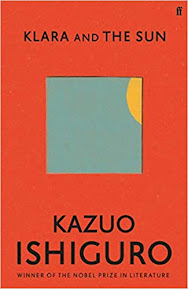Klara and the Sun by Kazuo Ishiguro
Klara is a solar-powered artificial friend, or AF, built to keep a child company in a near-future America in which children - middle-class children, at least - are educated by private tutors online and rarely mingle except at organised gatherings specifically designed to teach them social skills. After a time spent patiently observing the world from a city centre showroom and following the movement of the all-important sun, Klara is bought for Josie, a young teenager who lives outside the city with her mother and their housekeeper. But Josie suffers from debilitating weakness and health problems that confine her to bed for long periods, and we also learn that her older sister has died. Meanwhile Josie's only real friend, Rick, is physically fit and healthy but seems to be considered some sort of second-class citizen. Gradually, we're able to work out why this is - I won't explain, but it's enough to say that both Josie and Rick are suffering, in different ways, from decisions made by their respective parents.
It's Klara, the AF, who narrates the story, and everything that happens is filtered through her non-human eyes. Sometimes, Klara's perceptions are confused and fractured - figuratively on some occasions and on others, when her vision glitches and pixelates and the world becomes a confusing grid of jumbled boxes before her eyes, literally. She's unusually observant - a valuable quality in an AF, as means she can rapidly assimilate into a family and learn how to please them - and often more insightful than the humans around her, but there are times when her cognitive processing misinterprets what she sees.
It's also important to note that while Klara is not human, she does appear to suffer anxiety and concern, she feels gratitude and forms attachments to people and other AFs. It's this that is, for me, the source of much of the novel's sadness: Klara is not human and doesn't experience the world as a human being does, but her stoic acceptance of her role and her own non-humanity is painfully poignant.
Famously, the 'uncanny valley' is the point at which a figure looks so close to human that it unsettles us more than one that's less realistic - the smaller the differences, the more the non-humanity seems to become a problem. There are parallels to that in the way we perceive Kara. She almost thinks like a human, and almost experiences emotions as a human does - she even creates a form of religion for herself, believing that the sun that powers her is a god to which she can offer prayers - and it's the very fineness of that line between Klara and a human being that amplifies her otherness.
This unnerving contradiction is reflected in the novel's prose style. As always, Ishiguro writes with beautiful clarity and simplicity of language. There is a remarkable calmness to his writing, a quietness, that throws the vast scope of his themes into sharp relief - it is, if such a thing is possible, overwhelming in its understatement.
There are hints throughout that suggest we - like Klara when all she knows of the world is the portion of it she can see from her place in a shop window - are seeing only the smallest snapshot of the world in which it's set. At first, the presence of AFs seems to be the only real difference between Klara's time and ours, but then we discover disturbing facts about Josie and Rick and the cause of Josie's illness and it's clear that there is a bigger picture that isn't being fully revealed to us. Why does Rick's mother casually suggest that Josie's father, who has moved out of the family home to a different area, lives in a community of fascists? Who are the '423 post-employed people, 86 of them children' that are being 'cleared' from a building in the city?
Klara and the Sun is a book about humanity, motherhood and sacrifice, but it's also a book about hope. There's a strong sense of pathos about its ending, but also of contentment and of a purpose fulfilled. I loved this book, and it will stay with me for a long time.

Comments
Post a Comment